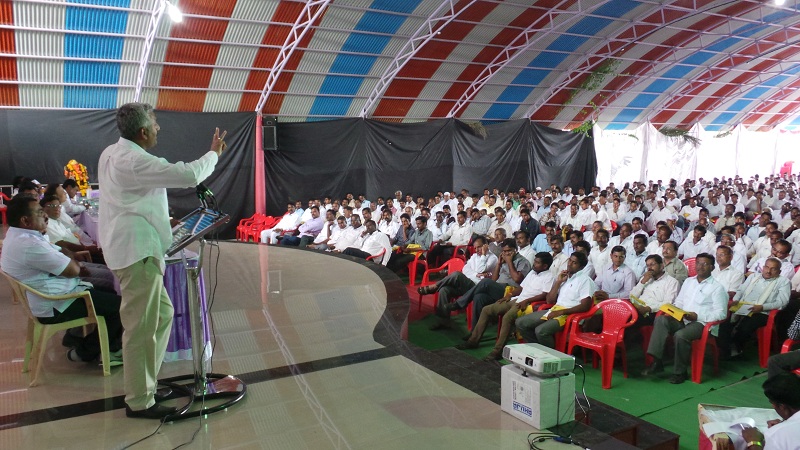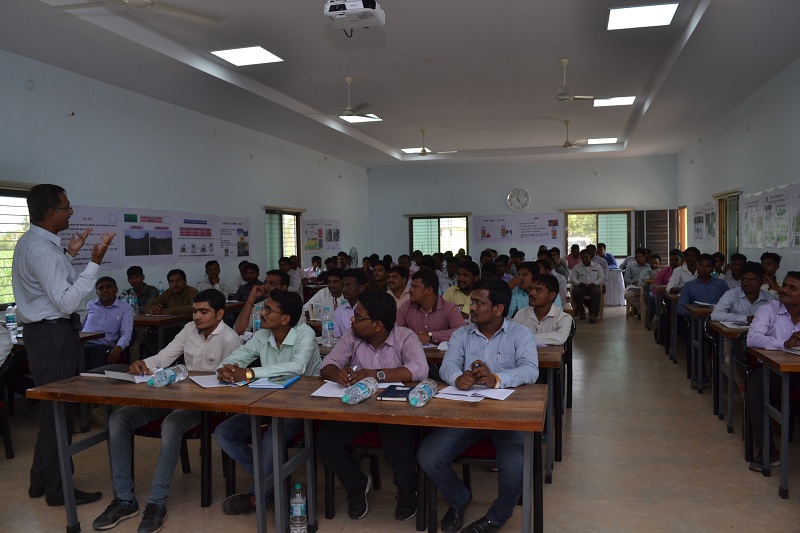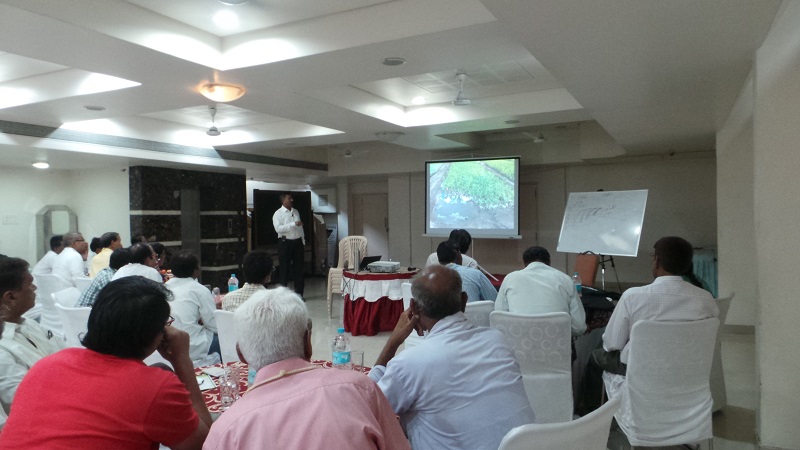


Mr. Babasaheb Gore, Founder & CEO Agri Academia is going to conduct this online course for all Pomegranate Farmers, Agri Extension workers, Consultants / Agronomists, Agri Input Dealer, Company & Representative.
Mr. Babasaheb Gore has experience of 13 years in pomegranate cultivation and training.
More than 6500 farmers benefited by paid training and he addressed +100K farmers through free farmer meetings.
For the farming community, he always thinks innovative education model, that's why thousands of farmers are following him through YouTube, Facebook, and Whats App.
He also developed a mobile platform "Farm DSS". Through it, he is giving precise advisory to pomegranate growers.
Due to the innovative attitude, he has developed 10 days online course for the pomegranate farmers. Details are given in the schedules.
Image Gallery



Who can join
Schedule
Day 1 : Pomegranate Scenario 9:00 AM - 11:00 AM
· Global and Domestic scenario of production, varieties and area under pomegranate crop.
· What are the opportunities as a pomegranate grower like domestic market, export and processing (Value addition)?
· What are the different varieties grown in India?
· Characteristics of different varieties.
Day 2 : Pomegranate Plant Physiology 9:00 AM - 12:00 PM
Role and functions of pomegranate plant like root, stem, leaf, flower and fruit
· How water and nutrients flow in plants?
· How pomegranate plants produce energy in photosynthetic process?
· Role of five different phenological stages of pomegranate plant for quality production.
Day 3 : Pomegranate Disease Management 9:00 AM - 11:00 AM
· Concept of disease
· What are the different diseases in pomegranate?
· Which climatic conditions are suitable for particular disease?
· What are the susceptible (critical) crop stages for various diseases?
· Details of Wilt and Bacterial blight and their management
practices.
· Different control measure for pomegranate diseases.
Day 4 : Pomegranate Insect Pest Management 9:00 AM - 11:00 AM
· What are different insect and non insect pests damaging
pomegranate?
· What are the susceptible (critical) crop stages for different
insects?
· Details of Insect pest, their life cycle and feeding habits.
· Different control measure for all pest including chemical
method.
· Mixing sequence of pesticides
Weeds
· Which are the stages of pomegranate, when removal of weeds is restricted?
· Different methods of weed managements
· Effective use of herbicides
Day 5 : Requirement for Pomegranate Plantation 9:00 AM - 11:00 AM
Site Selection –
· Improper site welcomes Wilt and Bacterial Blight in Orchard. So proper site selection considering water holding capacity of soil, drainage, slope, location and many more important parameters to be kept in mind.
· Quality parameters of good irrigation water and quantity
required depending upon age of plant, crop stage, soil and climate.
· Climatic requirement depending on phenological stages of crop.
· Land Preparation, Selection of Planting Material & Planting
Method
· Tissue culture or Gooty?
Day 6 : Irrigation and fertigation 9:00 AM - 11:00 AM
· Design and Installation of Drip Irrigation System
· Components of drip irrigation and fertigation system
· Selection of drippers depending upon water holding capacity of soil and slope
· Maintenance of drip irrigation system
· Acid treatment – Cleaning of drippers and laterals.
· Fertigation, pH, EC of irrigation water for good uptake of
nutrition
· Time period of fertigation
· Different fertigation equipments and their use
Day 7 : Plantation & Canopy Management 9:00 AM - 11:00 AM
· Canopy Management – Topping, watershoot and branch management
· Which Inter crop should I take in Pomegranate?
· Fertilizer application from Plantation to 18 month (till first bahar)
· Crop protection – Pest, disease and weed management from Plantation to 18 month (till first bahar)
Day 8 : Plant Nutrition 9:00 AM - 1:00 PM
· Role of different nutrients in different stages of pomegranate plants
· How to increase soil fertility?
· How to balance organic and inorganic fertilizers?
· Method of application of basal fertilizers
· White root management
· Fertilizer compatibility
· Nutrient antagonism and synergism
· Effect of soil moisture, soil temperature, humidity, sunlight, soil pH and EC on uptake of mineral nutrients
· Advantages and Disadvantages of organic and plastic mulching
Day 9 : Bahar Management 9:00 AM - 1:00 PM
· Details of five phenological stages of pomegranate
· Climatic requirements for different stages
· Pest and disease managements of different stages and their schedule
· Fertilizer management and their schedule for different stages
· Agronomical practices like pruning, thinning etc. schedule in
different stages
· Water management schedule in different stages
· Application of different slurries in different stages
Day 10 : Conclusion, 9:00 AM - 11:00 AM
· Know how and Do how of effective application of agrochemical, microorganism, slurry etc
· Harvesting grading packing and marketing of pomegranate fruits.
· Question and Answers
Online Via Zoom App
(Daily minimum 2 hours)
Download Zoom app : https://zoom.us/download#client_4meeting
Starts at June 4, 2020 9:00 AM
Ends at June 13, 2020 11:00 AM
Language : Hindi